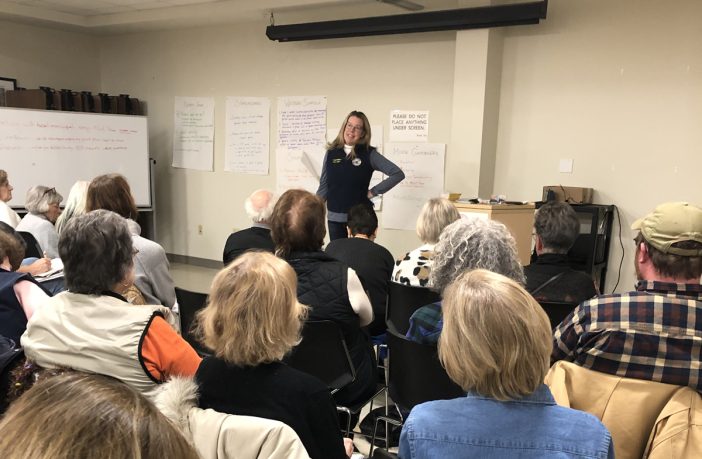A wide-ranging alliance of civic groups, environmental organizations, and garden clubs from across Suffolk County has launched a new coalition that will promote safe, local habitats for pollinating insects and wildlife, whose existence is critical to the survival of flowers, fruits, and crops.
The Suffolk Alliance for Pollinators (SAP) – initiated by Cornell Cooperative Extension of Suffolk County (CCE Suffolk), a non-profit community education agency – will work to make Suffolk County gardens pollinator-friendly by creating habitats and food sources for bees, butterflies, hummingbirds, and other pollinating insects and wildlife.
The alliance held its kick-off event earlier this month at CCE Suffolk’s headquarters in Riverhead in the presence of a standing-room-only crowd of more than a hundred gardening stewards. Attendees included both organizational leaders and Suffolk County Master Gardeners.
Pollinators are vitally important to agriculture, food systems, and ecosystems. They help thousands of flowering plants reproduce. Pollinator habitats also help prevent soil erosion and improve biodiversity.
The Suffolk Alliance for Pollinator’s mission directly aligns with that of the Pollinator Pathway, a national, volunteer organization working to establish pollinator-friendly habitats along a series of continuous “corridors” throughout the country. Since its establishment in 2017, pathways have been established in more than 200 towns in New York, Connecticut, Massachusetts, Pennsylvania, and seven other states, as well as Ontario.
Pollinator populations have fallen into sharp decline in recent years because of pesticide use and loss of habitat. Bee populations have decreased significantly, and monarch butterflies have declined by 94.6 percent over the last 20 years, according to the US Wildlife Federation.
SAP will promote pollinator-safe environments by educating home gardeners about new approaches to lawn care, promoting cultivation of native plants, fostering gardening best practices, and avoiding pesticides. This grassroots coalition will undertake outreach programs with the help of public libraries and a range of municipal entities.
“Many local groups are already engaged in protecting pollinators,” said Roxanne Zimmer, CCE Suffolk Community Horticulture Specialist and organizer of the Suffolk Alliance for Pollinators. “Our new alliance will serve as a unifying platform that will help to share insights and amplify our voices.”
“CCE Suffolk is proud to be leading this initiative,” said Vanessa Lockel, Executive Director of CCE Suffolk. “Pollinators are the backbone of a healthy environment, and we are excited to bring these groups together with the common goal of a pollinator-friendly Suffolk County.”
Suffolk County Legislator Kara Hahn attended the launch event and reminded attendees of the county’s ongoing commitment to environmental preservation.
“The establishment of the Suffolk Alliance for Pollinators reflects our communities’ mutual desire to create a healthier, more vibrant Suffolk County,” said Legislator Hahn. “I am confident that, in the hands of CCE Suffolk, this initiative will encourage residents to rethink their plantings, learn more about how they can help protect our pollinating insects and birds, and build effective pathways to support their survival.”
Pollination, according to the U.S. Forest Service, is “an essential ecological survival function. Without pollinators, the human race and all of earth’s terrestrial ecosystems would not survive. Of the 1,400 crop plants grown around the world, almost 80 percent require pollination by animals.”
To learn more about CCE Suffolk’s gardening initiatives, visit https://ccesuffolk.org/gardening.
Inquiries regarding the Suffolk Alliance for Pollinators can be directed to Roxanne Zimmer at [email protected] or (631) 727-7850 ext. 207.













